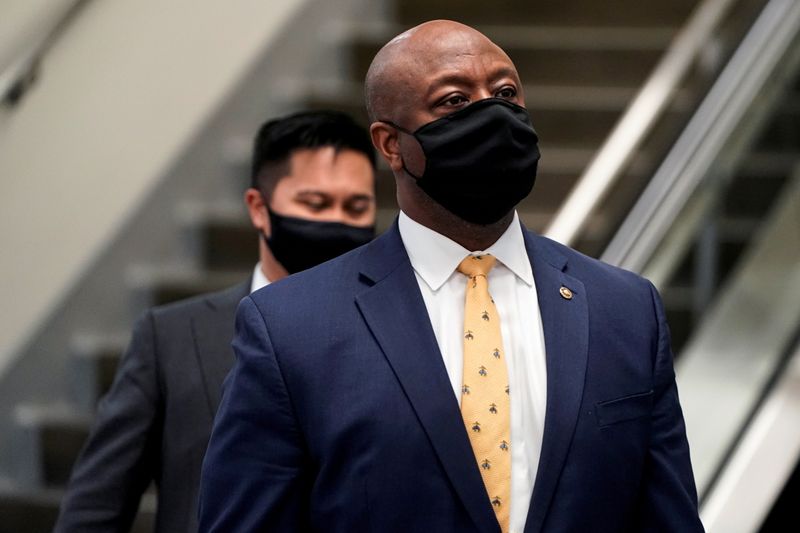WASHINGTON (Reuters) – A bipartisan group of U.S. lawmakers on Thursday started talks on a police reform bill, the day after Democratic President Joe Biden urged senators and representatives to act before the May 25 anniversary of George Floyd’s murder by a Minneapolis policeman.
Republican Senators Tim Scott and Lindsey Graham, Democratic Senators Dick Durbin and Cory Booker and Democratic Representative Karen Bass were among those tasked with reaching a consensus, Senate Democratic leader Chuck Schumer and two Democratic legislative aides said.
Lawmakers who attended the meeting said they were hopeful.
“Nothing happened in the meeting that deters me from being optimistic that we can get there,” Scott told reporters, though he rebuffed questions about whether lawmakers could meet Biden’s deadline.
Durbin said the meeting was “very constructive.”
“There’s trust in that room, and it’s important to see it through,” Durbin said.
A group of relatives of victims of police violence, including Philonise Floyd, the brother of George Floyd, met with lawmakers, including Schumer, and with White House officials on Thursday.
“They listened intently. It was emotional and it was very engaging,” said Ben Crump, the lawyer for Floyd’s family and other victims of police violence, outside the White House. “They committed to these families that they were committed to getting some meaningful legislation presented.”
The House of Representatives passed the George Floyd Justice in Policing Act, named for the African-American man killed when Derek Chauvin, then a policeman, kneeled on Floyd’s neck for more than nine minutes. Floyd’s death sparked a summer of nationwide protests over policing and systemic racism.
The bill has not yet been taken up by the Senate, where it faces steep odds of getting the bipartisan support it would need to pass the upper chamber. Democrats effectively control 50 of the chamber’s 100 seats, but most legislation requires 60 votes to pass.
Police unions have opposed changes made in the House’s bill to qualified immunity, which they say will further open the door to lawsuits alleging excessive force.
Scott also introduced a policing bill last year, but it was blocked by Democrats who said his approach relied too much on incentives and too little on mandating changes.
Scott has proposed making it easier for victims of police violence to sue law enforcement agencies, rather than the officers themselves. Bass has said it is important for victims to be able to sue individual officers as well as police, sheriff’s and other departments.
Asked about qualified immunity, Scott said they now have more information that allows them to work towards a result, which he said is positive.
Bass said the issue of qualified immunity was among the unresolved issues.
(Reporting by Makini Brice, Richard Cowan, David Morgan and Susan Cornwell; Additional reporting by Nandita Bose; Editing by Jonathan Oatis and Daniel Wallis)



















